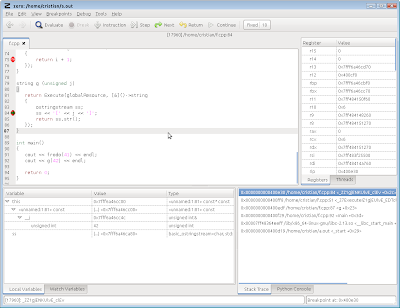
A friend of mine tried to compile the code from my previous post using GCC, only to get a bunch of error messages. As I suspected, the fix was to specify -std=c++0x on the command line. But before answering my friend's G+ message, I had to verify that the code worked with GCC. And one thing lead to another. After compiling, I was curious to see how my ZeroBUGS debugger copes with lambdas. What else to do on a rainy Sunday afternoon in Seattle, other than playing with some old C++ code while listening to Judas Priest?
ZeroBUGS is a visual debugger for Linux, a project that ate up all of my spare time between 2004 and 2008. I kept making small changes to it since, but very limited in scope. For some reason, since the Big Recession I found myself having lesser and lesser time for on-the-side projects. I tried for a while making ZeroBUGS a commercial enterprise, hoping to leave my day time job(s) and become self employed. I learned the hard way that selling proprietary software to Linux geeks is not very lucrative. Or maybe I should have partnered with a savvy sales guy, the kind that can sell refrigerators to penguins.
In late 09 I put ZeroBUGS on ice and went working on Microsoft Windows for a short bit (just long enough to write a few lines of code that will hopefully make it into the upcoming Windows 8.)
After leaving Microsoft and joining TableauSoftware, I yanked the closed source product off my web site, and re-released ZeroBUGS as open source (and free as in free beer under the Boost License.)I have not come upon major bugs in the debugger since a few years ago, when I discovered that the "step-over" functionality was broken for recursive functions.
So I was pretty confident the debugger will handle the new C++0X just fine. Except it didn't!
After some debugging, I traced the problem to the unnamed classes that the compiler generates to capture the surrounding variables. My debugger cashes data types by name for performance reasons. Unnamed classes normally occur in some scope, and thus there is no clash. Except that in the case of lambda functions, GCC generates unnamed classes at the outer most scope (i.e. the DWARF entries describing their type is at level 1, immediately nested in the compilation unit scope.) The data structures visualization was completely off, because the debugger used the wrong datatype (the first "unnamed" always won).
A simple hack that appends the file index and the line number to the offending "unnamed" solves the problem for now, as the snapshot above can testify.
While I think of a better solution this one will have to do. I am done with the computer for now, off to enjoy the weather and barbecue in the rain for the rest of the night!